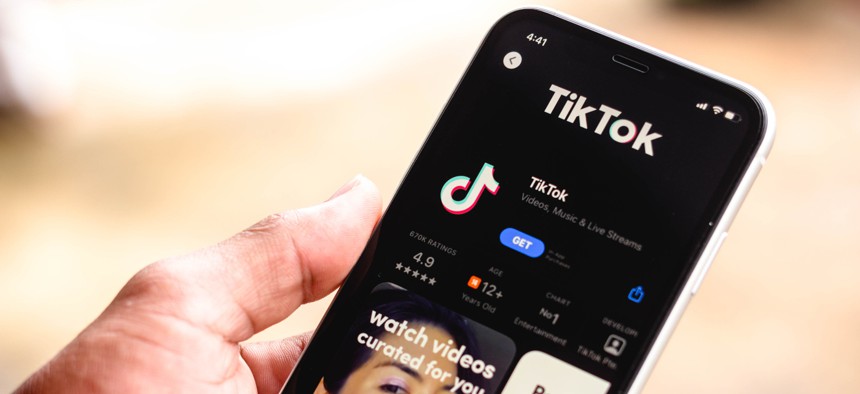New bill proposes 'made in China' tags for mobile apps

Rafael Henrique/SOPA Images/LightRocket via Getty Images
The legislation would require large online app stores — including Apple’s App Store and Google Play — to disclose the countries where their apps were developed and are currently owned.
A group of Republican senators introduced legislation Tuesday that would require mobile application stores to prominently identify the countries of origin for the services offered on their platforms, an effort that the bill’s sponsors said would enhance transparency around popular digital platforms — like TikTok — that have been accused of sharing U.S. users’ personal data with the Chinese government.
The bill — introduced by Sens. Tim Scott, R-S.C., Roger Wicker, R-Miss., and James Lankford, R-Okla. — would “require application stores to publicly list the country of origin of the applications that they distribute, and to provide consumers the ability to protect themselves.”
The legislative proposal — called the Know Your App Act — would apply to app stores that have “more than 20,000,000 users in the United States,” and would, in part, require them to denote “the country in which the developer [of the app] is headquartered or principally operates.”
The covered app stores would also be required to denote the country of origin of the “beneficial owner” of the digital services that they offer, which the legislation defined as “an individual who, directly or in-directly, through any contract, arrangement, understanding, relationship or otherwise” exerts “substantial control over the developer,” or owns or controls “not less than 25% of the ownership interests of the developer.”
If app developers do not provide accurate or updated information about their affiliations with foreign countries or individuals to covered online stores, then the digital stores would be required to issue warnings to the offending platforms.
If an app fails to provide updated information by “90 days after the date on which the first warning is issued,” then the offending platform would be removed from the online store.
In addition to requiring large app stores to list the countries of origin of their products, the legislation would — within 180 days of its enactment, and then on an annual basis — require the Commerce and Treasury secretaries to jointly submit to Congress a list of foreign countries whose national laws could subject developers or apps to government control “over content moderation, algorithm design or user data transfers.”
If an app is affiliated with a country listed on the report to Congress, then online stores would be required to “provide a disclaimer, in a prominent display on the application store page, that data from the application could be accessed by a foreign government.”
The proposal would also direct app stores to provide their users “with the option to filter out applications whose primary country of origin is a country of concern.”
In a statement, Scott — who announced his 2024 presidential campaign last month — said the bill would help Americans “make informed decisions about the online services they use in order to protect their data and security.”
“Requiring app stores to display an app’s country of origin is a common-sense solution that can help them do just that,” he added. “Parents shouldn’t fear that their family’s online privacy and security could be compromised when unknowingly using an app owned by a foreign adversary.”
Federal agencies and lawmakers have publicly shared national security and privacy concerns in recent years about the ties between popular digital apps and adversarial nations, with officials expressing particular alarm about TikTok, which is owned by the Chinese company ByteDance.
In an April blog post, analytics firm Apptopia noted that four of the five most downloaded apps in the United States — CapCut, Shein, Temu and TikTok — are affiliated with Chinese companies. The bill’s sponsors specifically cited these ties and said in a press release that “China’s national security laws provide a pathway for the Chinese Communist Party to compel application developers to control an application’s content or user data.”
The U.S. intelligence community and federal regulators have warned that TikTok users’ personal information — including locations, browsing histories and biometric data — could be shared with the Chinese government, and Congress voted late last year to ban the app from all government devices.
Lawmakers in both chambers of Congress have also introduced a flurry of bills in recent months designed to either ban TikTok, or empower the White House to restrict the use of the app and other technologies originating from China.
One proposal, introduced in March by Sens. Mark Warner, D-Va. — the chair of the Senate Intelligence Committee — and John Thune, R-S.D. — the Senate minority whip — would give the Commerce Department the authority to “review, prevent and mitigate information communications and technology transactions that pose undue risk to our national security.”
Some Democrats and Republicans, however, have pushed back on imposing an outright ban on TiKTok and other digital services tied to hostile foreign governments, citing free speech concerns.
Lankford framed the Know Your App Act as an informed alternative to some of the more draconian legislative proposals that have been floated by lawmakers, saying in a statement that “Americans should remain free to buy items from wherever they want, but the least Big Tech can do is label where Americans’ money is going when they download in the app store.”
“We already see the ways the TikTok app is a dangerous extension of the [Chinese Communist Party] that is collecting every user’s personal data and all of their contacts,” he added. “I want the ‘Made in China’ label and labels for any other countries where apps like TikTok originate to be clearly marked when and where they are downloaded.”






